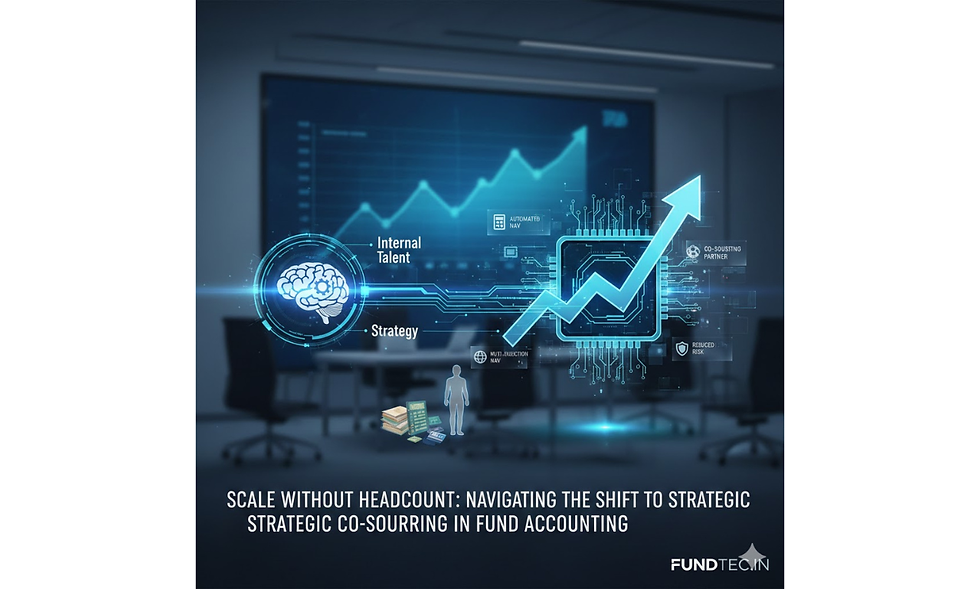Hedge Funds – the Next Frontier for Automated Reconciliation
- yash52
- Dec 25, 2023
- 3 min read
Updated: Jul 7, 2025
The recent regulatory mandates and the increased flow of institutional money into hedge funds have created a growing demand for automated reconciliation systems from the asset management community. Global institutional investment in hedge funds will increase 56% to $2.3 trillion by the end of 2017, from the end of 2012, according to a Citi Prime Finance research report released earlier this year. This will force hedge fund to compete for institutional assets on a playing field that’s new to them.

Hedge funds will be required to demonstrate better organization and more transparency around their investment strategy, including their security positions and management fees. To meet these demands, managers need to deploy solutions that are capable of efficiently aggregating, reconciling and accounting for both fund and investor level data.
For example, the US Commodity Futures Trading Commission (CFTC) considers documentation of swaps to be a critical component of the bilaterally traded, over-the-counter (OTC) derivatives market and portfolio reconciliation has been recognized as an important post-trade processing mechanism for reducing risk and improving operational efficiency. Many hedge funds will be labeled Major Swap Participants (MSPs), by CFTC’s definition, and will be required to reconcile at specific frequencies given their swap trading volumes.
DANGEROUS CONSEQUENCES
Historically, the quality of counterparty information has been a major challenge within the hedge fund community. In many cases, counterparties do not provide all of the important terms associated with OTC derivatives transactions. For example, the reference obligation or maturity date on a CDS could be excluded, causing issues down the line.
Coupled with issues similar to this, and the increasing regulatory burden, investor pressure to provide greater transparency and reduce fees creates “a new operating reality for hedge funds,” according to Deloitte’s “2013 Hedge Funds Outlook” report. According to Deloitte, hedge funds “may be able to alleviate this pressure and level the playing field by turning to partnership strategies that incorporate a blend of outsourcing and technology.”
Hedge funds that do not go down this road and decide to keep manual reconciliation processes or continue to use antiquated software should expect to face the following issues:
Exposure to operational risk from manual oversight, which can lead to significant loss or missed opportunitiesLack of accurate information around the cash or securities that are available to trade, which leads to missed opportunities in the markets, overdrafts and other opportunity costsLess than ideal reconciliation frequency due to a lack of resources, which could result in daily investment decisions that are based on outdated informationInability to scale to meet growing data volumes, which reduces the amount of new business that can be supported operationallyLack of auditing around the reconciliation process, which exposes the firm to difficult questions during an external auditIneffective use of staff time, which leads to employee dissatisfaction and potential turnover
CLEAR SOLUTION FOR THE WHOLE BUSINESS
In order to avoid the aforementioned operational and personnel problems, hedge funds need to implement a solution that helps them improve efficiency, promote transparency and minimize operational risk. Implementing the proper automated reconciliation solution also helps facilitate a smooth, monthly financial close process that supports every area of that investment manager’s business. The financial close process helps establish key performance indicators (KPIs) around all participants in their investment management processes, including custodians and prime brokers.
An efficient reconciliation solution also helps with the root-cause analysis, as well as identifying potential solutions for those custodians and prime brokers with KPIs that indicate below average performance. At the end of the day, an automated reconciliation solution plays a major role within any internal control environment that is looking to improve accuracy and eliminate barriers to the timely completion of the financial close process.
POSITIVE IMPACT
Automating the reconciliation process not only helps the hedge fund’s back office with improving efficiency and reducing overall operation risk, but also supports the activities of the trading desk by providing reliable position/cash information, as well as accurate profit and loss figures that are shared internally and with investors. Hedge funds can also use an automated reconciliation solution to support non-traditional reconciliation activities, such as identifying stale pricing, synchronizing an order management system (OMS) with an accounting system and reconciling security master information across multiple systems.
Hedge funds, as all of the players in the financial service space, need to evolve and adapt to the ever-changing economic environment. Faced with tough mandates from regulators, and even tougher demands from investors, hedge funds are turning to automated reconciliation systems as a way to improve their operations, mitigate risk and reduce costs.





Comments